Windows 7 is scarcely more than a month old. Most of the people who will eventually use it haven't gotten around to trying it yet; those that have are still settling in. And the Win 7 experience will change rapidly as remaining bugs are squashed, missing drivers arrive, and compatibility glitches are ironed out. Even so, it's not too early to start gauging what real people think of Windows Vista's replacement.
So to riff on Ronald Reagan's famous question from his 1980 debate with Jimmy Carter, Are Windows users better off today than they were a few weeks ago, back in the Vista era? We decided to ask the Technologizer community, a group of tech enthusiasts with a high propensity to acquire new operating systems quickly and push them to their limits. Starting on November 16th, we surveyed our readers (and Twitter followers) about their experiences with Windows 7. Our goal: to do a reality check on the mostly favorable initial reviews of the new OS (as well as our own survey of largely enthusiastic Windows 7 beta testers back in March).
The 550+ Windows 7 early adopters who took our survey mostly echo the positive response that the upgrade has received from professional reviewers, pundits, and users of pre-release editions. A sizable majority say they're extremely satisfied with the OS and rate it as a clear improvement on both the beloved Windows XP and the widely-panned Windows Vista. Crippling installation problems-the bane of every upgrader's existence, and always a legitimate reason to postpone switching OSes-were rare.
Our full report follows. But first, some quick facts on the folks who took our survey:
- Prior to using Windows 7, forty-six percent of respondents ran Windows Vista, and thirty-two percent ran Windows XP. Seventeen percent ran Vista and XP about equally, five percent ran an OS other than Windows, and a whopping 0.7 percent used a version of Windows other than Vista or XP.
- Seventy-three percent upgraded an existing PC to the final version of Windows 7, and eight percent are running it on a PC that came with the OS pre-installed. Fourteen percent are still using a pre-release version, and six percent are running it on a Mac via Boot Camp or a virtualization program.
- Sixty-four percent of respondents rate themselves as expert Windows users; thirty-five percent say they're intermediate ones. Less than one percent call themselves beginners.
- Sixty-one percent are using Windows 7 entirely or mostly for home/personal use. Twenty-five percent are using it about equally for home/personal and business use. Just fourteen percent are using it entirely or mostly for business use.
- Sixty-one percent are using a 64-bit edition of Windows 7, and thirty-one percent are running a 32-bit version.
- Eighty-two percent did a "clean" install of the OS from scratch; nineteen percent installed it over Windows Vista.
- Fifty-nine percent say they've used Windows 7 extensively, and thirty-six percent say they've done so a fair amount. Five percent say they've just used it a little so far.
It's important to note that our goal wasn't to survey a representative, projectable, normalized sampling of allWindows 7 users. The responses that follow are from members of the Technologizer community who chose to take our survey. Their opinions are their own-but we think they make for interesting reading even if they're not the last word on how average users will react to Windows 7.
Getting Up and Running
As with all things, first impressions count with operating systems. And if you've bought an OS as an upgrade, the first impressions it makes come in the form of the installation process.
As I've written before, there's no such thing as an operating system upgrade that doesn't cause headaches for some percentage of the people who install it. In the case of our survey takers who installed Windows 7, however, the number who encountered major hassles was very small-presumably in part because Windows 7 is so similar to Vista under the surface. The fact that the vast majority of respondents performed clean installations rather than installing on top of Vista surely helped, too.
Eighty-four percent say the process went off without meaningful hiccups; thirteen percent say it went fairly well. A total of three percent reported major problems, two-thirds of which were resolvable. Pretty impressive-when PC World surveyed Windows XP users shortly after that OS shipped, half reported installation difficulties.
The fact that respondents' upgrades tended to go smoothly doesn't mean that they didn't encounter any issues with their new operating system. Two problem areas stand out: More than forty percent had to try and resolve driver issues, and more than a third needed to deal with software incompatibilities. Other problems, however, were reported by a much smaller percentage of respondents. For instance, eleven percent reported crashes or blue screens of death. And only six percent said that Windows 7's performance was poor, which is a relief given that the original version Windows Vista quickly developed a reputation as a poky resource hog.
Are the percentages of users who reported problems impressively low, or unsettlingly high? That's subject to debate. But here's something that isn't: Both Windows XP and Windows Vista also suffer to some degree from all the gotchas that respondents said they encountered in Windows 7.
(In this infographic and those that follow, the scale of 0% to 100% represents the percentage of survey respondents who answered a particular question as indicated by the bars.)
Judging the Features
We asked respondents to rate eleven specific Windows 7 features that were new or substantially revised. (In retrospect, we should have also asked about Windows 7's DeviceStage, the peripheral-wrangling feature which I've found disappointing so far.)
Most of the features were well-received, especially the Taskbar, System Tray, window tiling, and desktop-revealing Aero Peek feature, all of which received Excellent or Very Good ratings from at least two-thirds of respondents. Even the new version of Vista's much-maligned User Account Control received an Excellent or Very Good from more than half of users, and only three percent said it was poor.
The Windows 7 feature which survey-takers were most lukewarm about isn't a Windows 7 feature, exactly-it's Internet Explorer 8, which first shipped back in March for Windows Vista and XP. While fifty percent of respondents say it's at least good, only nine percent rate it as excellent. Twenty percent said it's only fair and thirteen percent say it's downright poor, by far the most negative verdict given to any feature.
In the infographic below, the length of each bar indicates the percentage of respondents who say they've used each feature (virtually everyone rated the Taskbar, for instance, but only fifty-five percent have tried HomeGroups.) Features are ordered by the percentage of respondents who rated a feature as Excellent or very good. The more green the better; yellow and red indicate lukewarm and negative reactions, respectively.
Happiness Is...
Most of our survey respondents had no trouble setting up Windows 7, weren't crippled by problems once they got it installed, and found much to like in its changes. And that translated into impressive numbers for overall satisfaction. Seventy percent say they are extremely satisfied with the new OS, and twenty-four percent say they're somewhat satisfied, for a total of ninety-four percent who are satisfied to some degree. Four percent say they are neither satisfied nor dissatisfied, and two percent are somewhat or extremely dissatisfied. (When PC World surveyed Vista early adopters in 2007, it reported that only a little over one third of them were "very satisfied," and almost a quarter were "unimpressed.")
We asked respondents who said they were dissatisfied with Windows 7 to tell us why, but so few people were unhappy campers that the information we collected isn't statistically significant, so we won't chart it here. (Don't tell anyone we told you, but the majority of them said that Windows 7 is too expensive and doesn't have enough new features to warrant the cost.)
Does respondents' satisfaction with Windows 7 vary depending on whether they came to the OS from Vista or from XP? Yes-both groups are strongly favorable, but XP users are meaningfully less ecstatic. Seventy-nine percent of Vista users say they're extremely satisfied, while only sixty-one percent of XP users do.
We also gauged respondents' bottom-line appraisal of Windows 7 by asking them whether they'd willingly give it up for their old operating system. The vast majority-seventy-three percent-said they definitely wouldn't. Another eighteen percent said they probably wouldn't. Three percent said they probably would go back, and another three percent said they definitely would, or already had.
As with our question about overall satisfaction, Vista users gave Windows 7 a particularly hearty testimonial: Eighty-six percent of them say they definitely wouldn't go back. The percentage of XP users who say they've switched to Windows 7 permanently isn't quite that overwhelming, at sixty-one percent. XP users are also more likely to say they're probably or definitely abandoning Windows 7, although the overall percentage doing so remains low.

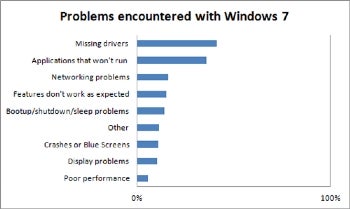
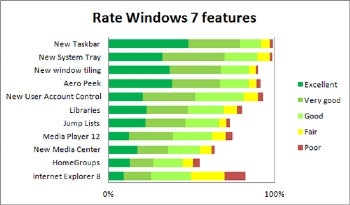
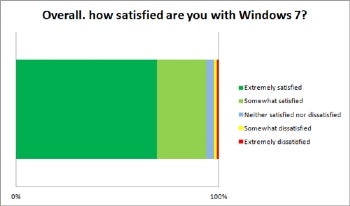
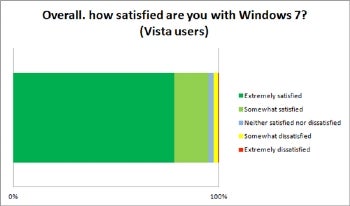

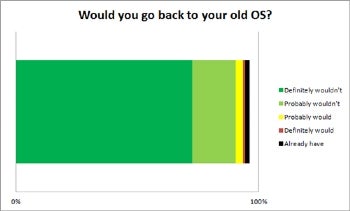


Tidak ada komentar:
Posting Komentar